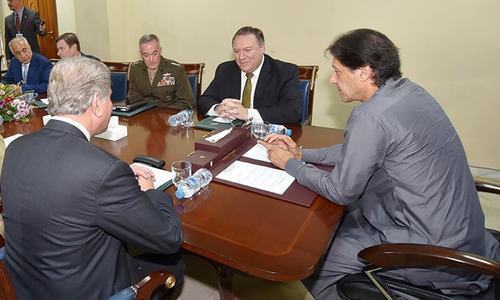FOREIGN Minister Shah Mehmood Qureshi rightly chose Afghanistan for his first official trip abroad.
In a visit to Kabul over the weekend, the foreign minister met the senior Afghan leadership and, according to media reports, discussed a range of subjects, from enhancing regional trade to a Pakistani offer to train Afghan police and other security personnel. Mr Qureshi and his Afghan counterparts also agreed to convene meetings of a number of bilateral and multilateral forums, especially the trilateral dialogue with China and the working groups of the Afghanistan- Pakistan Action Plan for Peace and Solidarity.
It is welcome that Afghanistan and Pakistan are engaging each other in a range of forums and in a numbers of areas of mutual interest. A broad-based engagement in dialogue can help lower tensions at the heart of the relationship.
Yet, if Afghanistan and Pakistan are to stabilise their relationship and bring peace to the region, it is in the security and peace arena that cooperation will be key. Afghanistan is looking towards Pakistan to help nudge the Afghan Taliban towards dialogue, while Pakistan is looking towards Afghanistan to eliminate anti-Pakistan militant sanctuaries in that country. Thus far, neither country has been able to receive the level of cooperation that it has sought from the other, and a familiar blame game has been indulged in.
But events inside Afghanistan are gathering speed and between political disarray, a resurgent Taliban, the spectre of the militant Islamic State group and the impatience of President Donald Trump with the US-led war effort, there is a possibility of Afghanistan once again sliding into chaos. Now is the time for Pakistan to extend all the cooperation it can to the Afghan state to set up a framework for a peace settlement with the support of regional and international powers.
Nevertheless, Afghanistan should also focus on removing irritants in the bilateral relationship for Pakistan. The closure of the Pakistani consulate in Jalalabad after interference and intimidation and disruption of trade across the border crossing are unwelcome distractions. While such unfortunate incidents can usually be contained, in a deteriorating security and political climate matters can quickly escalate. Moreover, Afghanistan should pay heed to Pakistan’s legitimate security interests in fencing large parts of the border and seeking the dismantling of anti-Pakistan militant sanctuaries in Afghanistan.
There is no easy road to regional peace; if there were, it would have been taken by now. But purposeful diplomacy and security cooperation can help achieve success.
Published in Dawn, September 17th, 2018













































